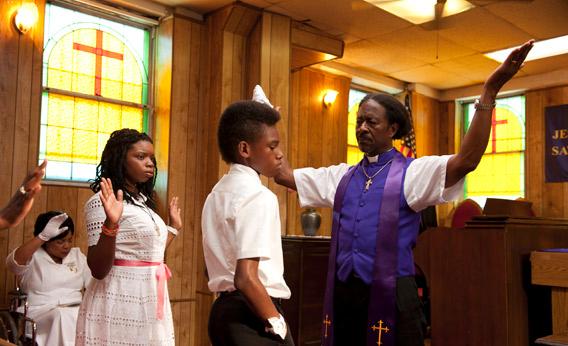Culture
A long, hard “Summer”

Red Hook Summer
dir. Spike Lee
Release Date: Aug 24, 12
- 1
- 2
- 3
- 4
- 5
- 6
- 7
- 8
- 9
- 10
Red Hook Summer, the latest in Spike Lee’s Brooklyn series, is an unmitigated mess. It’s sometimes a genuinely resonant one, and at other times a pretty terrible one, but on every level it’s one of his messiest, most unusual films in years. And yet, when compared to the laziness of She Hate Me or the workmanlike discipline of the highly overrated Inside Man, Red Hook Summer also feels like the work of a much younger filmmaker than Lee, one who’s still experimenting and discovering and testing the boundaries of his own style. And that’s a pretty exciting thing to see, even when some of those experiments end up as resounding failures.
Silas “Flick” Royale (Jules Brown) has spent his entire young life raised in privilege, living in a big house in Atlanta with his loving, spoiling mother and being left free to skateboard, adopt a vegan diet and carry around an iPad 2 that he uses to document everything he encounters, every second of the day. He’s therefore in for a major culture shock when his mother sends him to Red Hook to spend a summer with his heretofore unknown grandfather, the deeply devout Bishop Enoch Rouse (Clarke Peters of The Wire, a show that gets a shoutout in a hilarious moment late in the film). Enoch understands Silas better than Silas believes he does. He knows that the boy is troubled, though he isn’t sure of why, and to a point tries to ease him into religion gently, rather than simply strong-arming him. As Silas spends his summer working in his grandfather’s storefront church (known as “Little Heaven” to the locals), learning about the neighborhood and spending time with Chazz (Toni Lysaith), the young daughter of a parishioner, he learns how to both challenge and learn from his grandfather.
At its best moments, Red Hook Summer deals with religion in a tactful fashion, showing it a great deal of genuine reverence while also refusing to shy away from more difficult conversations on the subject. Particularly in the final act, which involves a significant twist that isn’t quite as lethal to the film as many have suggested, the notions of piety and responsibility are called into serious question. For the first time in what feels like many, many years, Lee clearly has a lot to say through Summer, and at times those things come through, largely because of Peters’ towering, fantastic performance. He’s given around a half-dozen opportunities to deliver extended sermons, which hinder much of the film’s forward momentum but also allow Peters to build his character through the man he becomes when he takes the pulpit, one much larger than he appears in everyday life. Conveying the true fire of a man inflamed with the Spirit, Peters is the single best reason to see Summer.
Accordingly, the film’s glaring woes emerge rather quickly whenever he’s offscreen. Brown and Lysaith were untrained, and it shows. Lee clearly doesn’t know what to do with Silas and Chazz’s part of the story as clearly and purposefully as he does Peters’, and after a while the sensation of dread starts to rear its head whenever they appear. While there’s a definite sweetness to their courtship, their performances are often too flat when they need a bit more genuine feeling, and some of the line deliveries are shockingly bad to the point where they become a distraction. (In particular, one argument after their vandalism of wet concrete will likely make you cringe.) Lee’s also painting with a pretty broad, heavy brush here; if you think that the film would let the symbolism of the iPad sit, without mentioning it on numerous occasions throughout, you would be mistaken.
There’s also the matter of that final twist, which I won’t spoil if the volume of Twitter users discussing it after the film’s Sundance premiere didn’t already, but which merits discussion nevertheless. It makes sense in context of the film, but it also leads to a truly jarring, frightening scene, which establishes both that Peters should be up for awards at year’s end and that the film has no hope from then on of wrapping itself up in any way that will feel earned. If anything it leaves the film feeling flat at the end, because the climactic montage of life in Red Hook, shot in a mix of lushly colorful digital and loving 16mm, feels asynchronous with everything that just happened before. Lee clearly loves these people, and Summer does too, but it’s also hard not to long for the clearly defined purpose and drive of his best work. It’s especially so when Lee briefly shows up in a very familiar uniform, still insistent that he’s gotta get paid. At least Red Hook Summer gives you hope that that’s not why he’s still in the game.